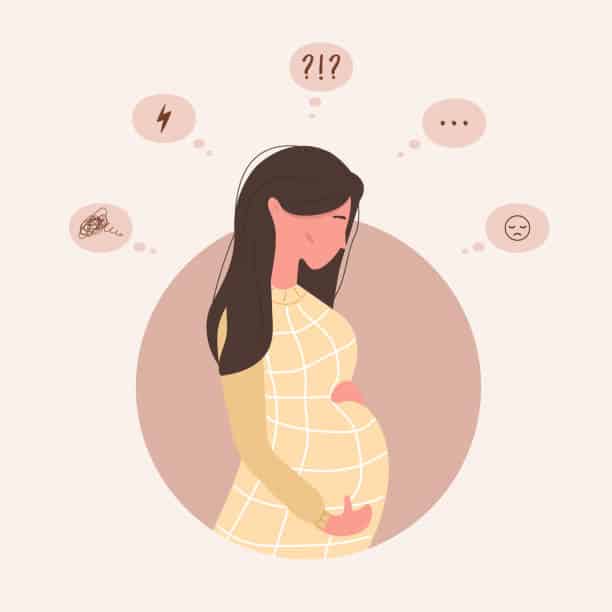
Introduction to Postpartum Anxiety Symptoms
A newborn’s debut is sometimes portrayed as a picture-perfect occasion filled with cooing noises, unending cuddles, and an overwhelmingly strong feeling of love. But postpartum reality can be far more complex. Beyond the happiness of welcoming a new life, many women face a silent battle: the difficulty of postpartum anxiety symptoms, which is frequently ignored and misinterpreted.
A persistent undercurrent of concern, fear, and a constant sense of being on edge characterize postpartum anxiety, in contrast to postpartum depression, which is characterized by emotions of despair and hopelessness. Mothers who experience these symptoms may feel as though they are not fully embracing the “bliss” of motherhood, which can be extremely lonely. They might find it difficult to bond with their child, feel overburdened by everyday responsibilities, and fight a never-ending war inside themselves against unwanted thoughts.
This does not indicate a mother’s weakness or imperfections. Millions of women worldwide suffer from the very real and treatable disease known as postpartum anxiety symptoms. By bringing attention to this unseen battle, we can enable moms to spot the warning signals, get help, and rediscover the joy of motherhood.
This extensive guide will act as a compass for you as you work through the complicated postpartum anxiety symptoms. We’ll go into the particular symptoms to look out for, investigate the causes of these symptoms, and most importantly give you the information and tools you need to get well. We’ll talk about the value of honest communication, the effectiveness of self-care, and the healing process transformative route.
Mama, now just take a deep breath. You’re not by yourself. Together, let’s take this journey one step at a time and turn those worried murmurs into a chorus of fortitude and resiliency.
Understanding Postpartum Anxiety Symptoms: Beyond Just Worry
Following childbirth, it’s quite typical to experience some anxiety. There are several obstacles faced by new mothers, ranging from difficulty feeding to lack of sleep. On the other hand, substantial, ongoing worry that interferes with day-to-day activities could indicate postpartum anxiety. The following are some typical signs to be aware of:
- Uncontrollably excessive worry: This goes beyond regular worries about the health and welfare of the infant. It can include worrying excessively about the baby’s security, money, or interpersonal relationships.
- Persistently feeling on edge: You could experience jitters, restlessness, or quickly becoming startled. You find it difficult to unwind and find mental tranquility even in serene circumstances.
- Panic Attacks: These abrupt, acute bouts of terror are marked by a racing heartbeat, breathlessness, lightheadedness, and a sense of being in overdrive.
- Sleep Disturbances: One of the main signs of postpartum anxiety is having trouble falling or staying asleep. Your worry may increase and you may become even more exhausted if your worries keep you awake.
- Inability to Concentrate: It can be difficult to concentrate on work, decisions, or even simple conversations when one is always worried.
- Irritability and Exhaustion: Even with adequate sleep, the emotional pressure can cause irritability, frustration, and extreme tiredness.
- Physical symptoms: Headaches, tense muscles, nausea, and digestive issues are examples of how anxiety can present physically.
- Intrusive thoughts: Unwanted and unsettling thoughts about hurting yourself or your child may invade your mind. It’s critical to keep in mind that these beliefs are not representative of reality and that getting help is necessary.
The Importance of Recognizing Postpartum Anxiety Symptoms
Postpartum anxiety symptoms can be subtle and easily dismissed as new-mom jitters. However, ignoring them can have significant consequences. Here’s why recognizing these symptoms is crucial:
- Effect on Motherhood: Unmanaged anxiety might hinder your ability to form a strong bond with your child, enjoy being a parent, and carry out your duty as a mother.
- Relationships Get Strained: Your partner, family, and friends may suffer as a result of your persistent anxiety and irritation.
- Increased Depression Risk: If postpartum anxiety is not addressed, it may result in postpartum depression, which will worsen your health.
- Long-Term Effects: Unmanaged anxiety can have long-term effects on your general state of mental and physical well-being.
Seeking Help for Postpartum Anxiety Symptoms: You Are Not Alone
The good news is that postpartum anxiety symptoms are highly treatable. If you recognize any of these signs in yourself, reach out for help. Here are some resources available to you:
- Consult your physician: Having an honest conversation about your symptoms with your doctor is the first step in receiving the assistance you require.
- Therapy: Teaching coping techniques and regulating anxiety are two areas in which cognitive-behavioral therapy, or CBT, can be extremely beneficial.
- Medication: To treat severe anxiety symptoms, medication may occasionally be required in addition to treatment.
- Support groups: Making connections with other women going through comparable difficulties can offer a feeling of belonging, empathy, and helpful coping mechanisms.
Beyond the Diagnosis: Handling the Transition with Postpartum Anxiety Symptoms
In addition to getting professional assistance, the following strategies can help manage postpartum anxiety symptoms:
- Prioritize Self-Care: Make self-care a priority because anxiety can worsen from sleep loss. Try to get as much sleep as you can despite the schedule of your newborn. Make time for deep breathing exercises and meditation to help you relax.
- Healthy Eating: To control your mood and energy levels, feed your body with wholesome meals.
- Exercise: Even a little walk can produce endorphins and lift your spirits regularly.
- Have Reasonable Expectations: Being a mother is a process of learning. Don’t try to be flawless. Recognize your difficulties and be gentle with yourself.
- Establish a Connection with Your Support Network: Don’t be embarrassed to ask your family, friends, or partner for assistance. Having a network of supporters can be beneficial.
- Join a Support Group: Making connections with other moms going through comparable struggles can be quite empowering. Talking about your experiences can help you develop effective coping mechanisms and reduce feelings of loneliness. Local or online support groups for postpartum anxiety can be quite helpful.
- Appreciate Little Wins: It takes a marathon, not a sprint, to manage postpartum anxiety symptoms. Appreciate each little accomplishment, whether it’s getting a good night’s sleep, handling a challenging circumstance coolly, or just having a few quiet moments.
- Practice Mindfulness: You can become more conscious of your thoughts and feelings without passing judgment by using practices like mindfulness meditation. This can help lower anxiety and manage intrusive thoughts.
- Embrace Relaxation Techniques: You can effectively calm your mind and body by practicing gradual muscle relaxation, deep breathing techniques, and gentle yoga. Investigate several methods to see which one suits you the best.
- Seek Professional Assistance for Troublesome Thoughts: It’s Critical to Get Professional Assistance Right Away if You Have Troublesome Thoughts About Hurting Yourself or Your Child. There is support available, and these ideas are not accurate.
The Invisible Armor: Normalizing Discussions Regarding Postpartum Anxiety Symptoms
Postpartum anxiety symptoms may seem like an invisible armor you have to wear all the time. It drains you, makes easy chores seem impossible, and keeps you from experiencing the joys of parenting. The truth is, though, you don’t have to fight this war by yourself. Having a conversation about postpartum anxiety symptoms is the first step to taking off this shell and regaining emotional stability.
The following are some strategies to normalize discussions around postpartum anxiety:
- Communicate Openly with Your Partner: Share your feelings and experiences with them. Their empathy and assistance can be a very useful tool for anxiety management.
- Speak with Your Friends: You can foster a sense of understanding and community by sharing your struggles with close friends. Tell them how they can help you, even if it’s just by lending a sympathetic ear or taking care of the kids.
- Engage with Online Communities: Postpartum anxiety-focused social media groups and forums can provide a wealth of information and a supportive community. Talk about your experiences, take advice from others, and get confidence from realizing you’re not alone.
- Tackle the Stigma: One aspect of normalizing discussions is to tackle the stigma associated with mental health issues. Share your experiences honestly, and inspire others to follow suit.
Beyond a Simple Diagnosis: Accepting You in Your Entirety
Postpartum anxiety is a journey that affects all facets of your life, not simply a diagnosis. Here are some strategies for accepting the complete you while on this journey:
- Take Back Your Interests: Spending even brief periods engaging in enjoyable activities can have profound therapeutic effects. Make time for the things that make you happy, whether it’s reading a few chapters of a book, having a soothing bath, or listening to your favorite music.
- Accept Your Imperfect Motherhood: Anxiety can worsen due to the pressure to be a “perfect” mother. Give up on illusory expectations and accept the magnificent chaos that is parenthood. Recognize your accomplishments and accept that obstacles are a necessary part of the path.
- Exercise Self-Compassion: Treat yourself with kindness. Though anxiety can be a cruel critic, you should be given grace and forgiveness. Let go of your grudges, acknowledge your successes, and concentrate on accepting who you are.
- Seek Creative Outlets: Writing, painting, or taking photos are some examples of creative outlets where you can express your emotions. These can be very effective tools for controlling anxiety. Try several things until you find something that speaks to you.
Conclusion
While experiencing postpartum anxiety symptoms, one may feel as though they are fighting an uphill struggle against intrusive thoughts and an unrelenting wave of worry. Mama, keep in mind that you are not fighting this battle alone. You too can overcome these hurdles; millions of mothers have.
You may progressively weaken anxiety by identifying the symptoms, getting expert assistance, and adopting self-care routines. The rumors of concern will start to die down and give way to a refreshed sense of confidence and serenity. Healing is not a straight line; there will be obstacles to overcome and periods of uncertainty. But as you go along and conquer obstacles, you gain back your strength and learn to love being a mother.
Recall that you are a powerful, competent lady. A priceless life that you brought into the world is evidence of your love and tenacity. It’s okay to seek assistance when needed, to rely on your network of support, and to put your health first. Savor the little successes, the times you spend with your child and the silent victories against severe worry.
The goal of this journey is to learn how to negotiate postpartum anxiety with courage and grace, not to erase the experience altogether. You can provide yourself and your child with a solid foundation for emotional well-being by using the information you’ve acquired, the tools at your disposal, and the steadfast support of people who care about you. Accept the giggles, cuddles, and untidy times that characterize being a mother. Mama, you are a warrior, and this path has brought you many more benefits than difficulties. Mama, now take a big breath and move toward the light. This is something you can handle.


